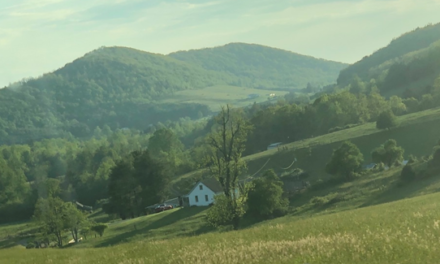
Associate Editor Connor Yeck: Sometime earlier this year, I stumbled upon a Twitter thread asking writers to share their personal websites. What started out as a passing glance ended with a dozen or so visits to home pages, blogs, “About” sections, publication links, contact forms, and résumés—not to mention every sort of author photo and color palette imaginable. This got me thinking of my own relationship with author websites, the web pages I’ve created (and sometimes abandoned), and the rarely linear path that gets us hitting that “publish” button the very first time. To explore these ideas a bit more, I asked a few writers in and around The Cincinnati Review and UC’s creative-writing program for their thoughts on managing their own websites, and for any advice they’ve gathered along the way.
What originally made you feel the need to create a website for yourself as a writer? Was there a particular moment, event, or milestone achieved?
Managing Editor Lisa Ampleman (lisaampleman.com): I first got a website in the months before my first full-length book was going to be published (2013). I’d noticed peers creating their sites, and I’d been working at The Cincinnati Review as a student editor, so (1) I’d realized that it was easier to find out information about our contributors if they had websites with links to their work online, and (2) because I’d been using WordPress as part of my duties at the magazine, I knew it would help me create a site with ease.
Associate Editor Taylor Byas (taylorbyas.com): I had gotten to a point where I felt like I had a good amount of publications, and I wanted a centralized place where anyone could access all of them. I also was in a period where people were wanting to contact me for work opportunities, and I found myself having to sift through Twitter DMs to do so. I created my website so people could go to one place to find anything they needed related to my writing, and if they wanted to reach out, they could do so with a click of a button!
Nick Molbert (nicholasmolbert.com): I created a website for myself because I found myself regularly visiting other writers’ websites to see their bios and publications. I’ve found websites—mine and others’—helpful for this reason, but I’ve always loved when writers include other things and tabs outside of these two (very practical) things. I may get lost in a page on a writer’s website that showcases other artistic ventures, like visual art, statements on teaching and pedagogy, or a blog featuring inspiring poems or interviews. Here, I’m thinking of writers like Karyna McGlynn, Luke Geddes, and Janice N. Harrington.
What would say having a website allows you to accomplish as a writer? Does having one provide something special, either creatively or professionally?
Molbert: I might speak for many writers when I say that we wish our website serves as a platform where people can find helpful information about us as people and writers. This may be more so dependent on social-media presence than website presence, but I’d hope websites are also a platform where journals and presses can reach out with solicitations for new work. I’d also like to think that websites might serve to facilitate smaller connections. For example, when I’m really struck by a poem or a book, I like to reach out and let them know via their website.
Ampleman: I use the site especially to help potential readers find poetry samples of mine online and buy my books. I’ve seen peers even sell signed copies of their work through their site, using PayPal, Venmo, or other simple processing tools. I’ve also set up a contact form so that people interested in reaching out to me can easily do so (I’m glad that feature exists now—you used to have to list your email address instead, possibly inviting spam!). People have used the contact form to solicit work from me, ask for a blurb for their own book, or otherwise try to connect.
Byas: Keeping a website updated is also a really wonderful way to get a big-picture view of everything you’ve accomplished. Maintaining my website also helps to remind me that even when I feel like I’m not doing much, I’m actually doing quite a bit. I also believe having my website has helped me obtain a lot of important and life-changing opportunities.
For example, almost two years ago, I posted a poem on Twitter, and it came across an agent’s feed. That agent then went to my website, read everything that was available, and reached out to me about representation. I don’t believe I would have gotten that email (and the agent) if I hadn’t had everything in one place. And you can curate it; you can direct people toward the work you really want them to see. It’s a good way to put your best creative/professional foot forward, and you get to decide what that looks like.
How’d you go about choosing what to include on your website? Any thoughts on content, layout, or design?
Byas: I definitely prioritized organization and simplicity. As much as the highly complex websites excite me, I also had to be realistic about what I could maintain, AND what would still look sharp on a mobile device since we’re always on our phones. I went with a simple black/white/gray theme, and made sure to make everything straightforward and easy to find. I set my bio as the first page so people can get to know me (and I don’t know, maybe it will catch someone’s eye if the website is their first introduction to me), and then they can use my navigation row at the top to decide what they want to look at. I don’t want my website to stress anyone out or discourage them from reaching out.
Molbert: I wanted to have the basics: bio, list of published work, and contact page. I chose to have a separate tab dedicated to my chapbook, Goodness Gracious, which includes basic information about the book, where to purchase it, and select praise for the book. Also, my teaching tab details courses I’ve built and taught as well as information about teaching honors I’ve received. Most importantly, though, is the “Inspirations” section of this teaching page. Here, I list friends and mentors who have inspired me and formed my thinking about education and care. In the future, I really want to build out this section into perhaps its own tab where I pay homage to those who’ve formed my thinking about these things.
Ampleman: I’m not a web developer, though I can do simple coding. I’ve used WordPress’s free templates and backgrounds, including one that looked like notebook paper in the background. My current background looks like a piece of paper taped to a gray blackboard. I haven’t been keeping up with the blog portion of the site, a practice that isn’t as common today as it was then.
As Lisa, Nick, and Taylor so helpfully share, the choice to create and manage a website as an author often comes down to forging stronger connections with the writing community. I know for myself, it’s hard to beat the experience of discovering an incredible new poem, tracking down the poet’s website, and suddenly having access to a microcosm of similar work. A website is a milestone, an embodiment of the author’s craft, and an extension of their interests, style, and creative approach. Likewise, there’s simply a sense of control and ownership that comes with a website—with publications, links, and various experiences scattered across the web, it can mean the world to have a place where you can contextualize it all and curate what an interested reader sees.
To close on a practical note, a website as a writer also entails a great deal of tinkering with services, setups, and designs. What platform? What order of links? What font? If you’re looking to kick-start your website-building venture, Writer’s Digest has an excellent walkthrough for everything you’ll need on day one. Happy blogging everyone!











